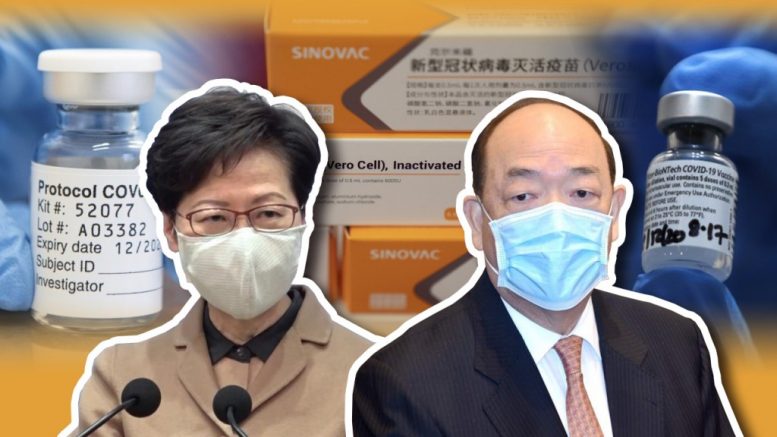By Chris Yeung —
In a show of humility and a sense of pragmatism, former Macau chief executive Edmund Ho had likened the former Portuguese-rule enclave to the “little younger brother” of Hong Kong when he was in power. He hoped “elder-brother” Hong Kong could take good care of Macau for it to emulate the success of the former British colony.
That was history.
Two news stories on Sunday (December 20) spoke something of the dramatic changes in the perception of the Hong Kong public towards the two cities, now both special administrative regions of China.
Put bluntly, Macau, once the self-proclaimed “little younger brother”, has outshone the “big-brother” Hong Kong in tackling the Covid-19 epidemic – and overall governance.
In Hong Kong, the daughter of a woman who died alone at home while waiting to be put into quarantine has demanded on Sunday a full government probe on what happened. The woman, who was surnamed Chiu, said she tested positive for Covid-19 earlier this month, and was sent to a treatment facility at the AsiaWorld Expo for isolation on December 9.
Her mother was deemed as one of her close contacts, and was also supposed to be sent to quarantine as a precaution. She was told to remain at home, waiting for transportation to a quarantine centre. She was found dead at her home three days later. She was later a confirmed coronavirus case.
Her mother’s death raises legitimate questions about whether there is a case of negligence or maladministration, or both.
As of Monday, no officials have come out to explain what happened and, more importantly, say sorry to the family.
The case makes a mockery of the pledge of Chief Executive Carrie Lam to lead a “people-oriented” government with a humanistic touch of policy-making and execution.
In Macau, Chief Executive Ho Iat-seng rubbed the sensitive nerves of Hongkongers when he told reporters Macau citizens could choose any vaccine products purchased by the government in the upcoming vaccination drive. “They can pick what they like… (Macau) Government will not impose a choice on them.”
Ho’s “people-oriented” approach contrasts oddly with an early statement by Hong Kong Chief Executive Carrie Lam that the public will not have a choice of the selected vaccines that the Government has ordered from various manufacturers, including at least one from mainland China.
Lam has argued the inoculation exercise was a government programme, not “an act of market,” which apparently means an act of shopping by people in markets. She went on to give a list of factors including logistics and inoculation venue to try to justify the decision of not giving people a choice, but without elaborating.
All those are merely technical problems that could easily be resolved. Simply put, they are nothing but excuses. The simple truth is that Lam is obsessed with fears about any moves that may cause embarrassment to the mainland authorities.
In an apparent attempt to stay clear of perceived biases against a China-developed vaccine made by Sinovac, Lam has decided to deny the public the right to choose their vaccines product.
Asked by reporters at a press conference earlier on how to pacify concerns about mainland-developed vaccines, she urged people not to “politicise” the issue.
(In an about-turn on Wednesday, Lam said the public could choose by waiting for the right time and the place for their preferred choice of vaccines to become available. She claimed she had been misunderstood and asked reporters to report clearly what she said.)
In stark contrast with Ho’s approach that won applause from netizens in Hong Kong, Lam’s ugly play of politics in the inoculation drive was greeted by curses in social media.
The more she has done to stop what she deemed as “politicising” vaccination, the more she has politicised the issue. The more she has tried to dictate the choice of vaccines on the public, the more sceptical the people are towards the inoculation programme.
Another case in point is about the awkward attempts by press officers to “remind” reporters at the daily Covid-19 government press conference not to use “Wuhan virus” in their questions. Reporters were told the World Health Organisation has already given an official name to the coronavirus, namely Covid-19.
Officials maintain the term “Wuhan virus” gave a bad name to Wuhan, the city in central China that is widely to be the origin of the pandemic, which they say is unfair.
The case of “Wuhan virus” sounds like a storm in teacup.
But it has created cumulative negative effects on the image of the Carrie Lam government, which is increasingly paranoid about matters that may make Beijing unhappy, vis-a-vis a growing confident Macau leadership, who knows results matter more than politics when it comes to averting crisis.
This article was first published on Apple Daily on December 23. It was updated with Lam’s U-turn.


Be the first to comment on "A tale of two ‘brothers’ in one country"